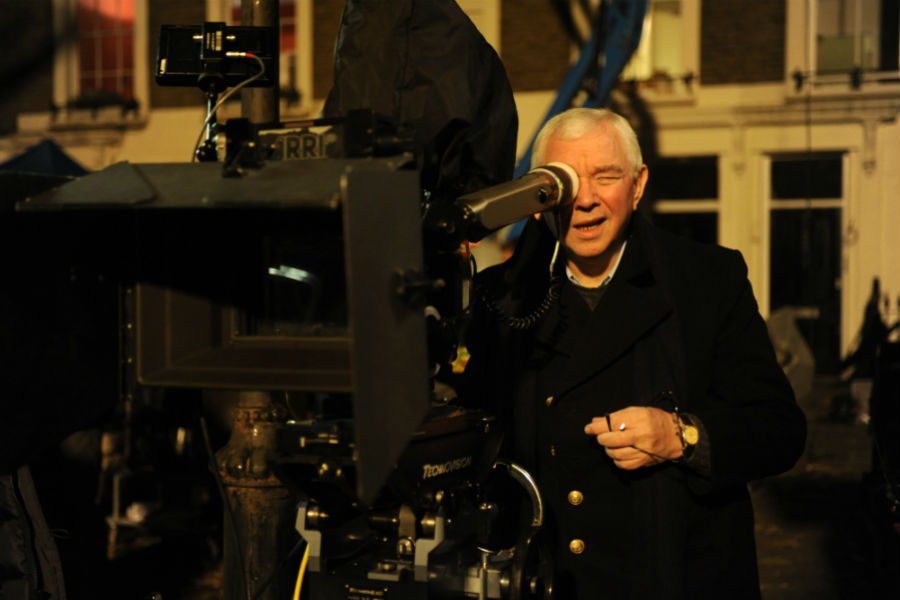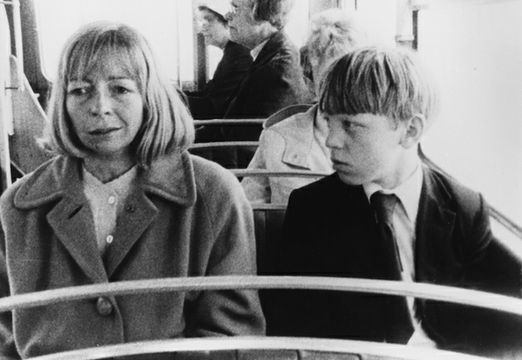Still The Outsider Looking In: Terence Davies In Conversation

Tonight, journalist Laura Brown interviews Britain’s greatest living film director live on stage. Here, she explains how Davies perfectly embodies the voice of the outsider, and why that is — still — so important…
British film’s most distinctive auteur is slap-bang in the middle of his most prolific period. Tonight, Terence Davies is going to be reflecting on film, on himself, sexuality, the film world; and how he has written, directed and presented some of the powerful tales about memory, loss, and being an outsider.
Thinking about this state of being — the essence of which Davies captures so exquisitely — made me remember the ultimate feeling of isolation: the first time I cried on public transport. I was reading a book, and a twist took me so much by surprise — tapping into my darkest fear of losing my lovely husband — that I began to cry. Snot and tears gathered on my top lip. I rummaged around for a tissue in the packed London Euston to Liverpool train. I tried to control myself but it was impossible. I shook sobbing for the next half hour. No one held out their hand of offered succour. I was embarrassed. Lonely. And terribly, terribly sad.
You’re not meant to cry in public. I know we’re all meant to be more American now, more in touch with our emotions. But try crying on a train, a bus or on the street and see how people react to figure out how far that stiff British upper lip remains stubbornly in place. Last week I watched, almost through fingers, the scene in Davies’ Children (part of TRILOGY (1983)) when his mother sobs on the bus. No one offers comfort; instead, she is breaking some unspoken rule. Deal with it. Crying is weak. Whatever it is, don’t make this journey, my life, uncomfortable with your emotions. It’s a two minute, twenty second scene with nothing but Shostakovich and an unflinching view. It’s brutal.
It seems there is this parallel world that runs alongside many of us. Society, the mainstream. In it everyone is together, straight and straight laced. They pay their taxes, have 2.4 kids, buy the house with the garden, do what’s expected of them, take it on the chin, eat their five a day, don’t drink more than the recommended amount. They’re stable, strong, no drama, no upset. Dependable.
They don’t have meltdowns on buses. They don’t scrutinize themselves, unpicking our personal flaws and thinking: “What is wrong with me?” They don’t seem to have that internal monologue that is eternally critical, dissatisfied, nervous, embarrassed, mortified. Outsiders.

Terence Davies feels like an outsider.
And it feels like he writes for outsiders. Whether it’s the autobiographic Robbie Tucker in TRILOGY, Lily Bart in House of Mirth (2000), or Hester Collyer in The Deep Blue Sea (2011), we’re only one step away from being on the outside looking in, ostracised and shunned. Life doesn’t run on straight lines; instead memory, emotion and feelings wrap and coil like headphone wires in your pocket. It’s never simple.
Davies isn’t all about melancholy, but there’s a lot of dwelling. We don’t do enough dwelling. We don’t learn from the past. We make the same mistakes over and over again. We think of what we’ve lost and we wish we’d made more of it when we had it. Terence’s lens quickly becomes a mirror and it’s not often that the way we see ourselves is through that role of the outsider; it’s like the popular kid suddenly realising that through the eyes of the lonely boy in the corner that she laughs at that she’s probably a bully. Too often we can see ourselves as fragile flowers in the centre of our own melodramas. The problem with that is that the worries of others don’t exist unless they impinge on our own.
I don’t know whether Davies would see his own status as an outsider has having informed how his fans see him. He has been frank about praying until his knees bled when, as a devout Catholic, he realised he was gay. He is adamant that he isn’t a gay filmmaker; instead a filmmaker who is gay. What he does is create space to breathe. Long, deep, breathing moments in a frantic, jostling world. There is no bullshit here, no self pity. Whenever I hear the line from his first short, Children: “Who’s a fruit then?”, I imagine hearing Terence’s sardonic drawl after it: “Me, actually”.
There isn’t anything wrong with not fitting in. There is nothing wrong with thinking the mainstream is load of hot baloney. Honest, no nonsense, authentic art. That’s what Davies creates. That’s what we, as artists, should all aspire to make. Art without compromise.
Laura Brown
Catch Terence Davies In Conversation TONIGHT, Saturday 8 November 2014, at The Black-E, Liverpool, 7pm. Tickets £10/8 – available at the box office (0844 873 2888) until 5pm, then on the door an hour before the performance
Watch a selection of Davies films — including TRILOGY — on BFI Player now
Read The Deep Blue Sea — Reviewed
Read Terence Davies — Liverpool’s Greatest Son





